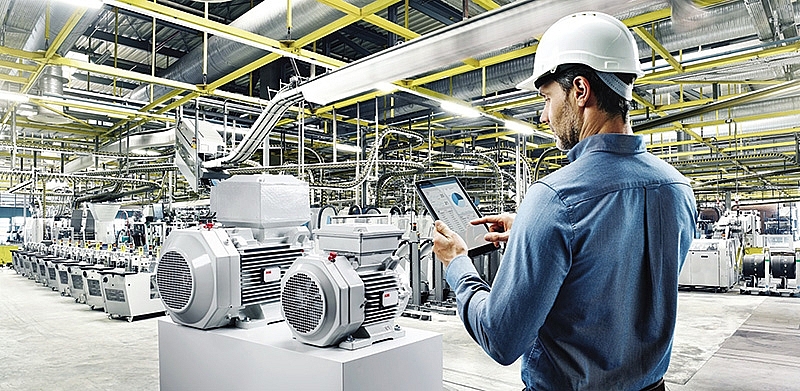ABB powers Industry 4.0 ambitions
 |
The so-called Fourth Industrial Revolution includes various themes and opportunities, but there is little clarity as to what it actually entails. What would be your general definition for this revolution?
Every industrial revolution has driven new economic possibilities and the Fourth Industrial Revolution, or Industry 4.0, is no different, as it brings profound and positive change.
It builds on previous revolutions, which began in the 18th century with the invention of the steam engine. The Second Industrial Revolution used electricity to create mass production, and the Third used electronics and information technology to automate production.
The main differences between previous revolutions and the Fourth is the pace of change – breakthroughs are happening at a rate unprecedented in history – and the scale of disruption. Today, every industry is being transformed at an accelerating speed. Being digitally enabled, that is having your machines, robots, and systems feeding data to the cloud, is an entry ticket to the Fourth Industrial Revolution. One could say the Fourth Industrial Revolution was triggered by the mass availability of unstructured data.
The proliferation of low-cost sensors and communications networks as well as successive falls in the price of computer processing power mean that data can now be easily and cheaply gathered from virtually any device, from household appliances to the largest industrial machines. ABB has some 70 million connected devices along with 70,000 industrial control systems installed worldwide.
In itself, the data we collect is of little value. The value lies in the intelligence we create from it. In the Fourth Industrial Revolution, productivity and performance depend increasingly on intelligence. If you know in advance when a robot or a machine is going to break down, you can avert a disruption in your supply chain, saving huge amounts of money and keeping your customers happy. Increasingly, ABB’s business is centred on providing this kind of actionable intelligence to its customers.
Industrial companies that invest in digital technologies are achieving significantly higher uptime, speed, and yield, and are laying the groundworks for advanced technologies such as artificial intelligence. And it’s not only industrial companies that will be impacted. In the years ahead, essential infrastructure, such as the power grid and the water supply, as well as transport networks, will increasingly be controlled and operated by autonomous systems and will be managed in radically different ways.
The ASEAN’s energy system is going through an unprecedented transition driven by new technologies, policy shifts, and changes in energy demand. What offerings does ABB have in the field of renewable energy?
Not only is digitalisation bringing in an industrial revolution – it is also radically changing energy. ABB has always been committed to providing technology solutions that strengthen the power infrastructure while minimising environmental impact.
Starting with the generation of electricity, our technologies help to harness energy from hydroelectric, solar, wind, and wave, as well as biomass, tidal, and geothermal sources.
This brings new challenges to the control and protection of electrical systems, as the grid becomes significantly more complicated. ABB’s experience with just about all forms of energy generation enables us to help design and implement protection schemes without compromising safety or manageability and keeping the electricity flowing from any, and every, available source.
Distributed energy resources and microgrids also offer new forms of access to electricity. Concerning energy storage, ABB offers turnkey energy storage systems that are ready for connection to medium- or high-voltage grids and cover a power range of hundreds of kilowatts to tens of megawatts.
Finally, we should remember that it’s not only about sustainable sources of energy but also about how we use energy. There are many new technologies, enabled and augmented by digitalisation, that enable tremendous energy savings and reduce energy consumption. Examples are advanced building automations systems and high efficiency motors and drives that power air-conditioning systems.
 |
| ABB develops Industry 4.0 solutions that are also used in its own factories |
What challenges do Vietnamese manufacturers face and how can they address these obstacles through digitalisation?
The global manufacturing space is highly competitive and dynamic, due to advances in technologies and changing consumer behaviour.
As we know, the Vietnamese economy and industrial base are growing quickly and, as competition increases, digitalisation allows businesses to save energy, optimise plant performance, improve quality and yield, and therefore compete better on the market. As Vietnam continues to attract investment from multinational corporations (MNCs) and serve international markets, these investors and consumers will increasingly demand traceability, safety, and sustainability, which digitalisation can help deliver.
Industrial customers, from power generation to the mining and cement industries, are asking for our help to solve difficult problems and improve performance. We do this by using data analytics and collaboration tools to unlock the hidden potential and to secure new customers and deliver higher efficiency and cost effectiveness while doing so.
In our own factories, we have installed manufacturing execution systems to provide real-time information on the manufacturing process. At our high-voltage component factory in Bac Ninh that came into operation in 2010, we trace the sources of materials of all products through these systems. We also use ABB smart sensors to monitor the performance of our robot motors and send alerts if key parameters, such as temperature or vibration, cross certain thresholds. The on-site wastewater plant is monitored and controlled, and all the information is available in the cloud to allow optimisation and remote monitoring. In addition, the ABB solar plant came online in June and is monitored through the Internet of Things technology, making the data readily available. These examples demonstrate ABB’s strong commitment to delivering Industry 4.0 solutions.
There are many more products and services to highlight, but foremost among them is the deployment of robots in a variety of industries, such as electronics, automotive, and food and beverages. Remote inspectors can monitor their performance and suggest modifications or software updates to improve it. Talent shortage in digital technology and automation is also critical and businesses need to invest in training and future skill development. ABB is committed to this. We believe that investment in future skills is essential to sustain not only our growth but also the economic growth of the markets we serve. Young and aspiring populations around the world are seeking to reduce the environmental impact and will increasingly demand that manufacturers and utilities take action. All appropriate action can be implemented most cost-effectively using Industry 4.0 solutions.
ABB’s products have proven successful in the areas of energy, industry, infrastructure, and transportation. Which sector is next on ABB’s agenda in Vietnam?
ABB takes a long-term view and we focus on where we can add value, matching our offerings to the different stages and needs of the industries and countries that we operate in. ABB sees a range of opportunities in Vietnam. Whether it is the growing power and infrastructure needs or the rapidly developing manufacturing base, our products, services, and digital offerings can make a truly exciting contribution.
We focus on three main areas. The first one is the key utilities, electricity and water. We see a lot of growth here and we supply the latest technology to manage and ensure high reliability in the grid. In addition, we are interested in renewable power generation, which is gaining momentum in Vietnam.
For the water industry, quality and leakage is now a major problem in cities, and we have helped Saigon Water Corporation to increase efficiency, reduce water leakage, prevent disruptions, and ensure that everyone has access to clean water in Ho Chi Minh City.
We also work with a range of industrial customers and manufacturers to ensure that they future-proof their operations through state-of-the-art technologies. For example, in food and beverage, our expertise in automation, power management, and robotics brings higher quality and speed.
In infrastructure and transportation, ABB helps achieve sustainable urbanisation by supplying smart technologies. There is much development and opportunity in smart buildings and demand management, enabled by connecting consumers with their living and working spaces and allowing them to control consumption based on data. In transportation, there is rapid change, with great potential in electric vehicles, rail, airports, and ports. In short, there are many exciting opportunities to drive sustainable growth in Vietnam and we look forward to continue playing a meaningful part in it.
What the stars mean:
★ Poor ★ ★ Promising ★★★ Good ★★★★ Very good ★★★★★ Exceptional
Related Contents
Latest News
More News
- Vietnam sets ambitious dairy growth targets (February 24, 2026 | 18:00)
- Masan Consumer names new deputy CEO to drive foods and beverages growth (February 23, 2026 | 20:52)
- Myriad risks ahead, but ones Vietnam can confront (February 20, 2026 | 15:02)
- Vietnam making the leap into AI and semiconductors (February 20, 2026 | 09:37)
- Funding must be activated for semiconductor success (February 20, 2026 | 09:20)
- Resilience as new benchmark for smarter infrastructure (February 19, 2026 | 20:35)
- A golden time to shine within ASEAN (February 19, 2026 | 20:22)
- Vietnam’s pivotal year for advancing sustainability (February 19, 2026 | 08:44)
- Strengthening the core role of industry and trade (February 19, 2026 | 08:35)
- Future orientations for healthcare improvements (February 19, 2026 | 08:29)

 Tag:
Tag:




















 Mobile Version
Mobile Version